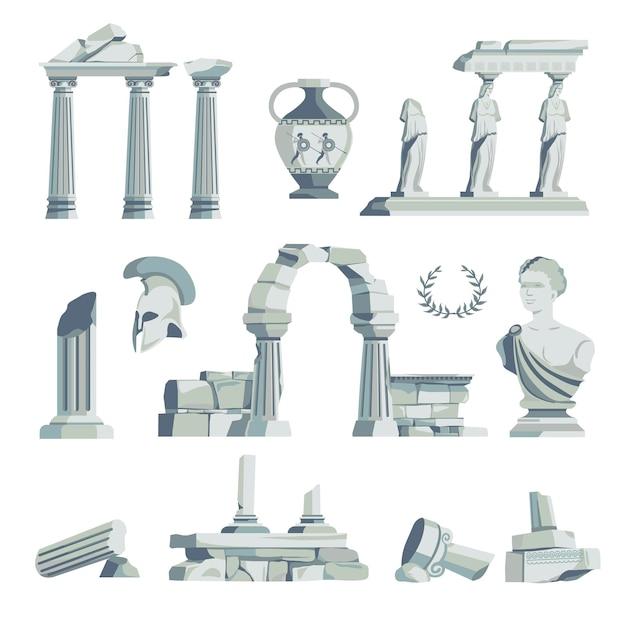Ancient Greece has provided the world with a wealth of cultural and intellectual treasures, and its literature is no exception. Dating back to as early as the 8th century BCE, Greek literature encompasses a wide variety of genres, from epic poems to tragedies, comedies, and philosophical treatises. This blog post will delve into the characteristics of ancient Greek literature, exploring its qualities, common themes, and its universal significance.
Greek literature is known for its exceptional quality, often regarded as the foundation of Western literature. It is deeply intertwined with Greek philosophy, mythology, and history, giving it a unique flavor that continues to resonate with readers today. The Ancient Greeks used various literary devices, such as metaphors, similes, and allegories, to convey their ideas and explore the human condition.
Ancient Greece boasted renowned centers of study for literature, with Alexandria in Egypt being one of the most important. Here, scholars gathered and preserved the works of Greek and Roman authors, ensuring their dissemination across generations. Greek literature, with its astonishing diversity and timeless themes, holds a universal appeal that transcends time and place. So, let’s embark on a journey to unravel the enchanting world of ancient Greek literature and discover the enduring legacy it has left on our civilization.
Now, let’s dive into the fascinating characteristics of ancient Greek literature and uncover the literary wonders that have shaped the course of history.

Characteristics of Ancient Greek Literature
Literary Marvels of Ancient Greece
When it comes to ancient Greek literature, be prepared to be swept away by the sheer brilliance and timeless beauty of their literary works. From epic poems to philosophical dialogues, the Greeks had it all. So, what exactly were the characteristics that made their literature stand out? Let’s dive into the captivating world of ancient Greek literature and uncover its unique traits.
Mythology and Gods
Ancient Greeks had a penchant for weaving mythology into their stories, and why wouldn’t they? With a pantheon of gods and goddesses at their disposal, their narratives were rich with divine intervention and mesmerizing tales of heroes and monsters. Whether it was the mighty Zeus, the cunning Athena, or the vengeful Poseidon, the gods added flair and depth to the stories, captivating readers with their power.
Poetic Excellence
One cannot discuss ancient Greek literature without mentioning the indelible mark left by their poets. The Greeks mastered the art of poetry, with Homer’s epic poems, the Iliad and the Odyssey, stealing the limelight. These works were characterized by their rhythmic verse, skillful use of similes, and vivid imagery that transported readers to mythical landscapes. Be prepared to embark on a poetic journey like no other.
Philosophy at Its Core
The Greeks were deep thinkers, and their literature reflected their philosophical inclinations. Thinkers like Plato and Aristotle used the medium of dialogue to explore profound questions and ponder the nature of reality, morality, and the meaning of life. Through their writings, the ancient Greeks managed to intertwine philosophy seamlessly with literature, creating intellectual masterpieces that continue to engage readers even today.
Drama and Tragedy
Ancient Greek literature would be incomplete without mentioning the theatrical brilliance of playwrights like Sophocles, Euripides, and Aeschylus. Tragedy took center stage, exploring the human condition, fate, and the consequences of excessive pride. The Greeks crafted captivating narratives with unforgettable characters and emotionally charged plots that left audiences in awe. Brace yourself for the dramatic rollercoaster ride of ancient Greek theater.
Oral Tradition
Unlike today’s written literature, the ancient Greeks primarily relied on the oral tradition to pass down their stories from generation to generation. This meant that their literature was meant to be performed and heard, rather than read silently. The oral tradition allowed for improvisation, creative embellishments, and a dynamic exchange between the storyteller and the audience, making ancient Greek literature a truly interactive experience.
Conclusion: A Gift to the World
Ancient Greek literature is a gift that continues to inspire and captivate readers across centuries. With its mythical allure, poetic mastery, philosophical depth, dramatic flair, and oral tradition, it stands as a testament to the creativity and imagination of the ancient Greeks. So, delve into their literary marvels, and let the magic of ancient Greece transport you to a world where gods roam, heroes conquer, and ideas transcend time.
And there you have it! A glimpse into the mesmerizing characteristics of ancient Greek literature. Prepare to be awed, entertained, and enlightened by the literary gems that have withstood the test of time. The Greeks truly knew how to weave words that continue to resonate with readers today.

FAQ: Characteristics of Ancient Greek Literature
Who was the leading philosopher of ancient times
The crème de la crème of ancient philosophers was none other than the legendary Aristotle. Known for his sharp mind and profound insights, Aristotle’s ideas still echo through modern philosophy and continue to ignite intellectual curiosity.
What were the qualities that made Greek literature exceptional
Greek literature had all the bells and whistles – it was captivating, imaginative, and thought-provoking. From epic poems to drama and satire, Greek writers mastered the art of storytelling and had an uncanny ability to bring characters to life. Their works were rich with vivid descriptions, emotional depth, and philosophical undertones that pushed the boundaries of literature.
What were the common themes explored in Greek literature
Greek literature was a veritable buffet of themes. They dabbled in everything from mythology and history to love and tragedy. Heroes and their quests, gods and their shenanigans, mortal struggles, and the eternal battle between fate and free will – these were just a few of the juicy topics that satiated the literary hunger of ancient Greece.
What is the connection between Greek and Roman literature
Greek and Roman literature were like two peas in a pod. The Romans had a major crush on Greek culture and literature, so much so that they shamelessly borrowed, imitated, and adapted Greek works to suit their own taste. Think of it as a literary remix that blended the best of both worlds.
What materials did ancient Greeks use for writing
Well, back in the day, the ancient Greeks didn’t have fancy laptops or tablets. They relied on good ol’ papyrus (a type of paper made from plant fibers) and parchment (animal skin treated for writing). Imagine trying to scroll through your Instagram feed on that!
What were the distinguishing characteristics of ancient Greek literature
Ancient Greek literature was like a Greek salad – full of flavors and ingredients that made it distinct. It had a knack for drama, honoring the gods, and exploring the human condition. Greek literature boasted intricate plots, complex characters, and a perfect pinch of tragedy to keep readers on the edge of their stone seats.
Which was the ultimate hotspot for Greek and Roman literature studies
If you wanted to be in the literary in-crowd back in those days, you better head to Alexandria. This vibrant Egyptian city was the beating heart of intellectual pursuits, housing one of the most famous libraries of all time. Scholars flocked there to soak up the knowledge and expand their minds.
What gives Greek literature a universal appeal
Greek literature isn’t just a Greek thing; it’s a global phenomenon. Its timeless themes, relatable characters, and profound exploration of human nature strike a chord across cultures and centuries. Whether you’re in ancient Greece or modern-day New York, the stories and ideas of Greek literature continue to captivate and resonate with audiences around the world.
What were some characteristics of Greek city-states
Ah, the Greek city-states, where to begin? These little powerhouses had a fierce sense of independence, a knack for politics, and a thirst for democracy. With their own laws and customs, they were like a big Greek family where everyone had a strong opinion and a love for spirited debates.
Who deserves the title of the father of Greek literature
Homer, the OG of Greek literature, takes the crown. He wrote the mother of all epic poems, the Iliad and the Odyssey, which laid the foundation for Greek storytelling. Thanks to Homer, we have a glimpse into the heroic adventures of Odysseus and the Trojan War. Talk about leaving a literary legacy!
What were the two groups that Zeus pitted against Prometheus
Zeus was quite the matchmaker when it came to enemies. He set Prometheus against the mighty Titans and the crafty humans. As punishment for giving fire to mortals, Prometheus found himself in the midst of an epic battle between gods and Titans, all thanks to Zeus playing puppet master.
What do the Greek alphabet letters look like in English
Ah, the Greek alphabet – it’s like learning a whole new secret code. So, let’s decode a few letters, shall we? In English, we have the alpha, beta, gamma, delta, epsilon, and zeta, just to name a few. It’s like alphabet soup with a Mediterranean twist!
And there you have it, my curious readers! A whirlwind tour through the captivating characteristics of ancient Greek literature. So grab your toga, grab a good book, and immerse yourself in the mythical world of the Greeks. Who knows, you might just unearth a few timeless truths along the way.
